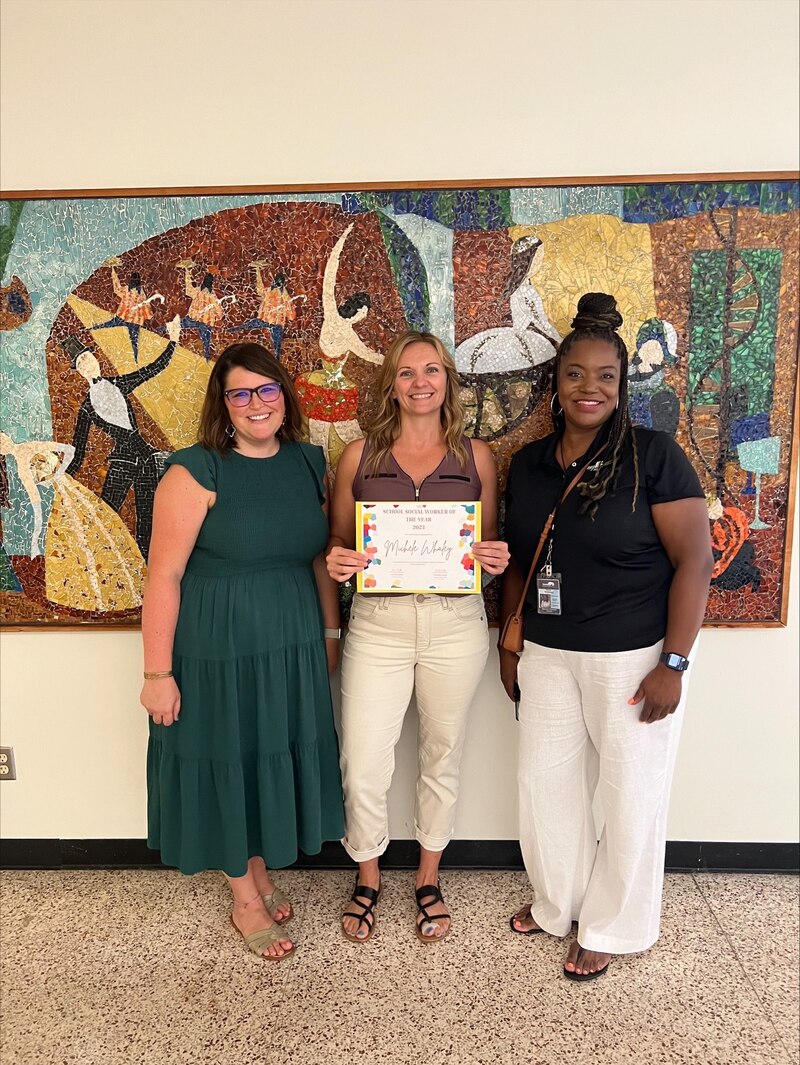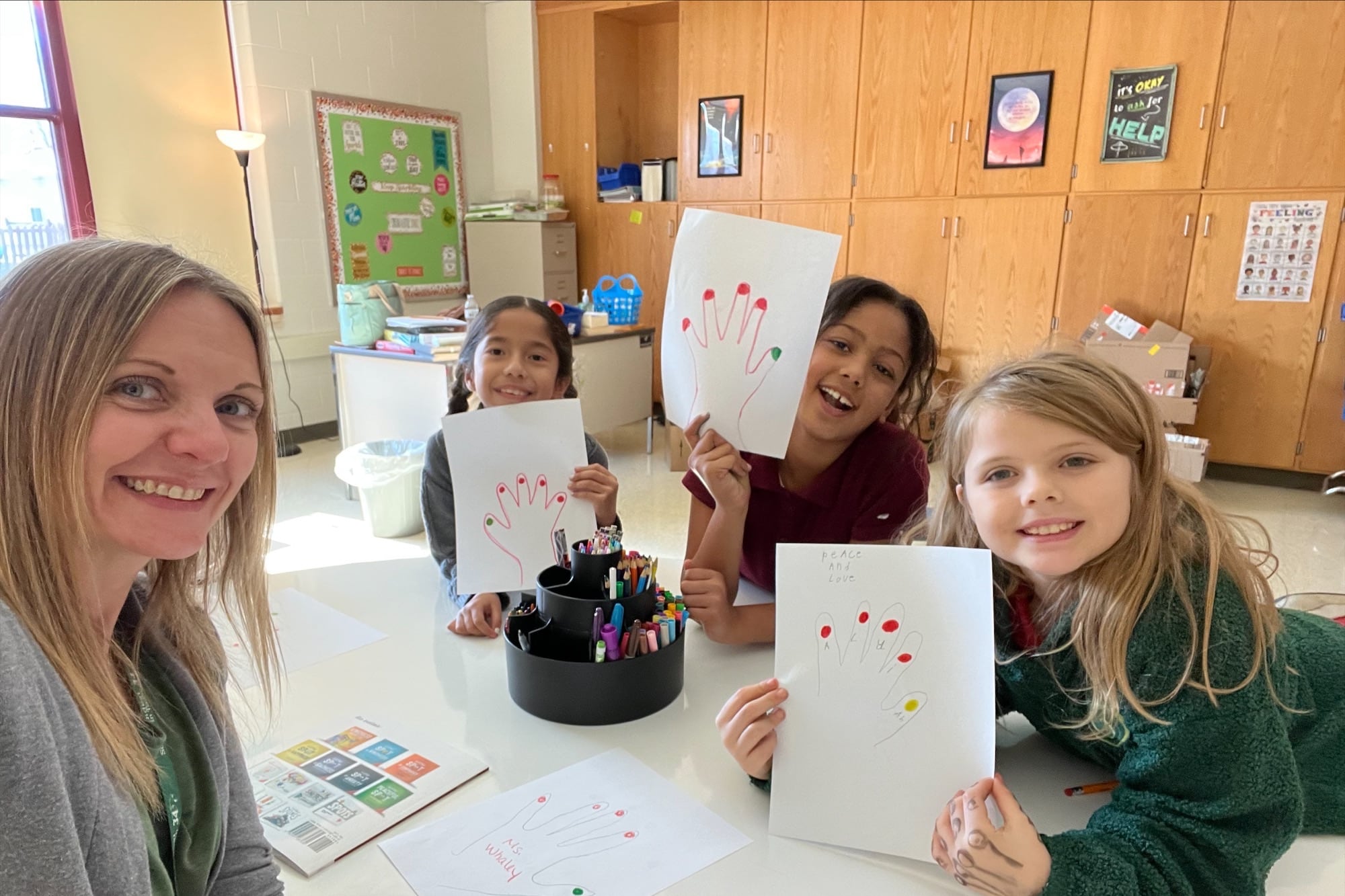Sign up for Chalkbeat Indiana’s free daily newsletter to keep up with Indianapolis Public Schools, Marion County’s township districts, and statewide education news.
The more caring and loving adults in a child’s life, the better.
That’s the approach Michele Whaley carries into her job as a school social worker at Eleanor Skillen School 34 in Indianapolis.
“At school, I can provide someone that will nonjudgmentally listen and provide support, skills, and perspective which they can then take into other aspects of life,” she said.
And while her role can impact a student’s life in many ways, it’s also impacted her own life. Whaley has been a school social worker for 15 years and was named Indiana School Social Worker of the Year in July by the Indiana School Social Work Association.
“At this point, it is an integral part to who I am,” she said of being a school social worker. “It has made me a better parent to my 10-year-old son and, quite frankly, taught me how to parent. It has allowed me to see the impact a caring, safe, and positive role model can have on the life of a child, which drives me to continue this work despite how difficult it can be.”
This interview has been lightly edited for length and clarity.
What led you to become a school social worker?
I have to give most of that credit to Jane Zobel, who was the first school social worker I ever met. I took a job working as a contract employee at an IPS school prior to receiving my Master of Social Work. While in that job, I got to spend time seeing the work Jane got to do with students, families, and the community.
She was just so caring and loving towards students, staff, families, and the community. She provided a safe space for students to feel cared for and just did so much for the school community. It allowed me to see how much difference someone can make in a school environment where you see and work with all students.
It inspired me to return to finish my master’s degree, and the rest is really history.

What does a typical day look like for you?
My days can vary so much depending on the needs of the students and the school as a whole. My work spans the spectrum from whole group instruction on character education and development (social/emotional learning) to individual services such as counseling and crisis support. On any given day, I might be teaching in a classroom, intervening with behavior, supporting a student that is grieving, providing a family with food resources, helping plan school events, or conducting conflict resolution. Also, I’m also a part of various leadership teams and community engagement opportunities. One of the best parts of the job is the variety.
School social work has a strong basis in advocacy, justice, and respecting the voice of those you work alongside. For me, it is important to advocate for and enhance the voices of students and families to make sure they have all of the academic and non-academic support needed.
Conflict resolution and kindness are keys to anti-bullying because when children approach situations with kindness and how to resolve problems in a respectful manner, it reduces bullying behaviors.
What do you think is misunderstood about your role and wish more people knew?
I believe one of the common misunderstandings from a community perspective is that all social workers are linked to the Department of Child Services. Another is that people don’t realize that school social workers are dual-licensed professionals in the state of Indiana. I hold an Indiana Department of Education License and am a Licensed Clinical Social Worker, or LCSW, through the Indiana Professional Licensing Agency. Due to this, I am a trained mental health professional that is able to support students and families in many ways because many other mental health professionals in schools can only work with their clients rather than the larger school population.
What would you do more of if time were no object?
Honestly, if time were not an object I would do more 1:1 student work, especially with older students. The work that can be done with children as they start to enter adolescence is amazing. It’s universally a difficult time because that’s when we start to navigate the world without as much help from our parents and guardians.
It is the beginning of us starting to figure out where we want to fit in the world and who we fit alongside and as the social dynamic becomes more complex … it’s a lot.
So it’s fulfilling to help students understand more about how their mental health, feelings, and coping skills function and can improve. I would also do more work with bringing community resources and partners into the school if time weren’t a barrier.
What’s the best advice you’ve ever received, and how have you put it into practice?
I think the number one piece that’s impactful to me is make time for yourself. The social work career is very geared towards assisting others and it can take an emotional toll. School social workers interact with emotionally deep and difficult topics on a daily basis so knowing how to separate or at least compartmentalize that is so important. Another important thing is remembering you might never know the difference you are making in someone’s life just by being there for them.
You spend your days trying to help others. How do you wind down after a stressful day?
Over the years, I’ve worked hard to practice what I preach and understand the coping skills that work for me. After an emotionally difficult day, I usually need to vent to someone that cares about me, and I need to engage in physical activity such as a walk or exercise of some sort. I maintain a pretty solid boundary with work and do not bring work home, so that helps as well.
MJ Slaby oversees Chalkbeat Indiana’s coverage as bureau chief. She also covers access to higher education and Warren Township Schools. Contact MJ at mslaby@chalkbeat.org.







